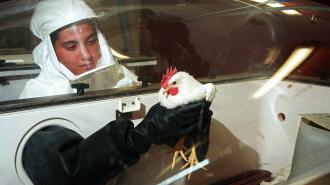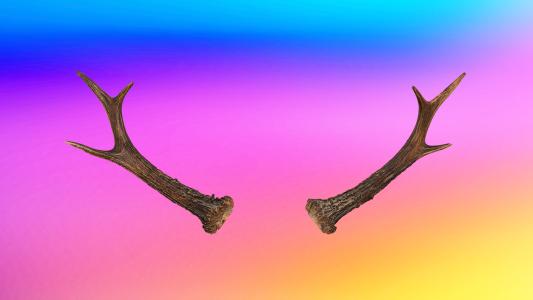H5N1 bird flu is sweeping through bird flocks and chicken farms around the world, decimating wild birds and poultry alike — and the strain has already jumped from birds to several different mammal species.
Now, vaccines are already being prepped for two important populations: egg-laying hens and human beings.
Executives at pharmaceutical companies Moderna, GSK, and CSL Seqirus told Reuters that they are developing, or are about to test, human vaccines that are better aligned with the avian flu virus.
Meanwhile, in the Netherlands, a research team from Wageningen University & Research (WUR) and Utrecht University has announced that two vaccines were 100% effective at preventing the virus’ spread in chickens — albeit in a laboratory setting.
H5N1 bird flu is sweeping through bird flocks and chicken farms around the world, decimating wild birds and poultry alike — and jumping to several different mammal species.
Although experts still believe the risk of a human pandemic is low, infections in various mammal populations the past couple years — including seals, sea lions, minks, and foxes and skunks — have put researchers on alert.
Fortunately, compared to the coronavirus, we are “already ahead of the game,” Michelle Wille, an expert in avian influenza at the University of Sydney, told Science News.
“This virus is catastrophic for bird populations”: As its name suggests, “highly pathogenic avian influenza,” type H5N1, is a slippery virus that is especially well suited to infecting birds.
Hundreds of millions of domestic poultry have already either been killed by the virus or culled in an attempt to stem its spread; in addition, millions of wild birds — which can carry the virus vast distances — have likely died as well, although official counts are hard to find.
“This virus is catastrophic for bird populations,” Wille told Science News.
The virus’ potential transmission among the mink and marine mammals suggests that this specific type of H5N1 virus “could perhaps also acquire the ability to transmit among humans,” virologist Florian Krammer and infectious disease expert Stacey Schultz-Cherry wrote in Nature Reviews Immunology.
While considered unlikely, the possibility cannot be discounted — hence the war footing of the vaccine manufacturers Reuters spoke to.
Executives at pharmaceutical companies Moderna, GSK, and CSL Seqirus are developing, or are about to test, human vaccines that are better aligned with the avian flu virus.
Protecting people: There have been a few cases in people, although thus far there’s no evidence of person-to-person transmission. Of seven recent infections identified in China, six recovered, with the status of an eighth unknown, Science News reported; in four reported cases, including in Colorado and on a Spanish mink farm, there were no respiratory symptoms, meaning contamination, not infection, could be the cause.
And a lethal case reported in Cambodia, while caused by H5N1, was from a different clade from the strain that’s sweeping global bird populations right now.
Even still, vaccine developers have begun preparations to crank out and distribute H5N1 vaccines.
In the case of a pandemic, vaccine manufacturers would switch gears, from producing the typical seasonal flu shots to creating ones aimed at H5N1, Reuters reported; the manufacturers already have the capacity to produce millions of doses.
Some of the shots are also pre-approved based on human trial data proving its safety and that the vaccine triggers the right immune response, Reuters noted, meaning that they may not require further lengthy human trials, even if they need to be updated to match the current strain that may eventually infect humans.
According to a February briefing from the head of the WHO’s global influenza program, Wenqing Zhang, there are around 20 vaccines currently licensed that aim at H5-type flu, Politico reported.
There are a couple caveats when it comes to the vaccine’s production and rollouts, however. It could take five to six months to develop the vaccine using traditional flu vaccine methods, the WHO’s Richard Webby told Politico.
And those “traditional methods” have an additional ironic weak point: many involve producing the vaccines in eggs. Mass death of hens, from infection or culling, could hamper production.
Protecting hens: Despite their being an obvious victim and vector of the virus, the economic damage that comes with millions of birds being killed, and the risk of tightly-packed poultry becoming a witch’s cauldron for the virus to rapidly evolve and spread, there is no universal approach to vaccinating poultry.
“If you’re a country that doesn’t normally have highly pathogenic avian influenza, you don’t tend to vaccinate, whereas parts of the world where it’s endemic, like China, they vaccinate routinely,” Paul Digard, a virologist at the University of Edinburgh, told Politico.
The US, UK, and Europe generally don’t vaccinate their birds.
Researchers set out to test 4 vaccines to see if they protected egg-laying hens from the virus. The team reported that two of the vaccines were 100% effective in preventing transmission.
The Dutch WUR and Utrecht team set out to test 4 vaccines to see if they protected egg-laying hens from the virus. Four vaccines either approved by at least one country or in late-stage development were examined: two versions of a new vaccine called HVT-H5, a novel DNA-based vaccine, and a vaccine called Nobilus.
The first three were new candidates, while Nobilus is older, having already been approved in the Netherlands. (Although whether it protects against the current bird flu has not been tested, the researchers said.)
Four groups of ten hens each received a dose of one of the four vaccines. After vaccination, five of the hens were deliberately infected with influenza, then grouped back together with the other five to see if the virus would spread between vaccinated chickens.
The team reported that both HVT-H5 vaccines were 100% effective in preventing transmission, while spread was identified in the other two candidates.
While a good result in the lab, it’s also just that: a good result in the lab.
“It is important to investigate whether the vaccines work well under field conditions in poultry farms, how long the vaccines protect, and whether one vaccination is sufficient,” Nancy Beerens, head of the National Reference Laboratory for avian influenza, said in a WUR statement.
The Dutch agricultural ministry will begin field tests this summer, and France, Italy, and Hungary will also run vaccine trials, Bloomberg reported.
“There are still some hurdles to overcome, but the results of our research are an important first step towards vaccination against the bird flu virus in poultry,” Beerens told Bloomberg.
We’d love to hear from you! If you have a comment about this article or if you have a tip for a future Freethink story, please email us at [email protected].






